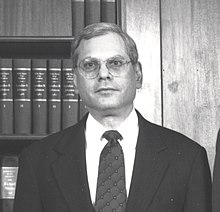| This article includes a list of references, related reading, or external links, but its sources remain unclear because it lacks inline citations. Please help improve this article by introducing more precise citations. (February 2022) (Learn how and when to remove this message) |
| Larry Meyer | |
|---|---|
 | |
| Member of the Federal Reserve Board of Governors | |
| In office June 24, 1996 – January 31, 2002 | |
| President | Bill Clinton George W. Bush |
| Preceded by | John P. LaWare |
| Succeeded by | Donald Kohn |
| Personal details | |
| Born | (1944-03-08) March 8, 1944 (age 80) New York City, New York, U.S. |
| Political party | Democratic |
| Education | Yale University (BA) Massachusetts Institute of Technology (MA, PhD) |
| Academic career | |
| Field | Macroeconomics |
| School or tradition | Neo-Keynesian economics |
| Influences | Hyman Minsky |
Laurence Meyer (born March 8, 1944) is an American economist who served as a member of the Federal Reserve Board of Governors from 1996 to 2002.
Meyer received a B.A. (magna cum laude) from Yale University in 1965 and a Ph.D. in economics from the Massachusetts Institute of Technology in 1970. He then taught at Washington University in St. Louis for 27 years.
Meyer also ran an economic consulting firm, Laurence H. Meyer and Associates, with two former students. He won several economic forecasting awards while running the company. After he moved to the US Fed, he sold his interest in the firm and it was renamed Macroeconomic Advisers.
In 1996, he and Alice Rivlin were nominated to the Fed by US President Bill Clinton. At the Fed, Meyer was one of the governors most ready to raise interest rates, because he believed that the economy was operating near full capacity, and especially that the employment rate was near the non-accelerating inflation rate of unemployment, or the rate that would cause inflation. Alan Greenspan, the chairman at that time, was one of the leaders of the idea that improved productivity would allow the Fed to keep interest rates low without causing inflation.
After leaving the Fed, Meyer became a Distinguished Scholar at the Center for Strategic and International Studies. He also founded Monetary Policy Analytics, Inc. dba LH Meyer
Publications
- Meyer, Laurence (2004). A Term at the Fed : An Insider's View. Collins. ISBN 0-06-054270-5.
External links
- Meyer's speech "Come with me to the FOMC"
- Macroeconomic Advisers biography
- CSIS biography
- Interview with the Minneapolis Fed
- Statements and Speeches of Laurence H. Meyer
- Monetary Policy Analytics Inc. Site
- Appearances on C-SPAN
| Government offices | ||
|---|---|---|
| Preceded byJohn P. LaWare | Member of the Federal Reserve Board of Governors 1996–2002 |
Succeeded byDonald Kohn |
- 1944 births
- 21st-century American economists
- Economists from New York (state)
- Federal Reserve System governors
- Living people
- MIT School of Humanities, Arts, and Social Sciences alumni
- People from the Bronx
- Washington University in St. Louis faculty
- Yale University alumni
- Clinton administration personnel
- George W. Bush administration personnel